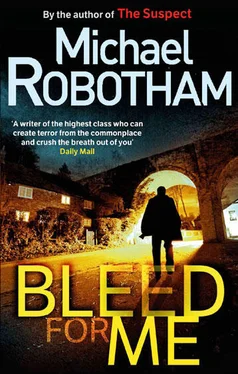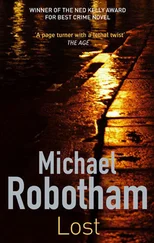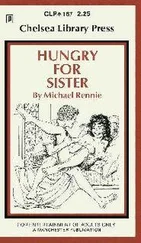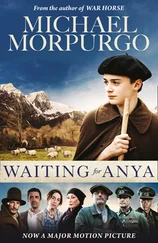‘The kid has had some problems. Two years ago he was arrested and deported from Croatia with twenty other hooligans after England played a World Cup qualifier. He also has convictions for racially aggravated assault and low-range drink driving.’
Breakfast is served. Ruiz tucks a paper napkin in the collar of his shirt and scoops baked beans on to a corner of toast.
‘I came up with nothing on Danny Gardiner. Kid’s clean.’
‘You still haven’t told me what I’m doing here.’
Ruiz gives me a wry smile. ‘You were right about the school teacher.’
‘Gordon Ellis?’
‘Yeah, but he wasn’t always called Ellis. He used to be Gordon Freeman, but three years ago he took his mother’s surname and became Gordon Ellis.’
‘Is that important?’
‘It helps if you’re running away from something.’
Ruiz is going to tell me the story in his own time. He slurps a mouthful of tea and dabs his lips with a napkin.
‘What do you know about his wife?’
‘Natasha?’
‘Yeah.’
‘Ellis said they met at school. Childhood sweethearts.’
‘Well, he wasn’t lying.’
‘Meaning?’
‘Natasha’s maiden name is Stewart. She was thirteen when Gordon Ellis started teaching at Sorell College. It’s a private girls’ school here in Edinburgh.’
‘She was his student?’
‘Music and drama. I put in a call to the headmaster and set off a dozen alarm bells. Twenty minutes later I had a plummy-voiced solicitor on the phone telling me to ever so politely fuck off.
‘According to her school yearbook, Natasha left in year nine Gordon Ellis transferred a year later. She claimed to be nineteen when they married, but her proper birth certificate puts her at three years younger than that.’
‘How old is she now?’
‘Officially, she’s just turned eighteen.’
‘Maybe they hooked up after they both left the school,’ I say.
‘OK, but why lie about Natasha’s age on their marriage certificate? ’
I think back to my meeting with Natasha outside the school. She was picking up Billy, who is Emma’s age.
‘But she has a son?’ I say.
‘Not her boy,’ replies Ruiz. ‘That’s where it gets really interesting. ’
Wiping his plate clean with a half-slice of toast, he consumes it in two mouthfuls and finishes his tea. Then he pulls fifteen quid from his wallet. Leaves it on the table.
‘You still haven’t told me what I’m doing here.’
‘We’re meeting a family. They’re called the Regans. They don’t live far.’
‘Why am I meeting the Regans?’
‘They have a daughter, Carolinda, who was married to Gordon Ellis.’
‘He’s been married before?’
‘Exactly.’
‘Divorced?’
‘Not exactly.’
‘What then?’
‘According to Gordon Ellis, Caro packed her suitcase and took off. Happens all the time. Some people don’t like waking up every morning and seeing the same old face on the other pillow, day in, day out. Depresses the shit out of them.’
‘You’re such a romantic. So why did she walk out?’
‘She escaped into the arms of a secret lover, according to Ellis, only nobody has ever met the gentleman in question.’
‘I don’t understand.’
‘Caro hasn’t been seen since. She hasn’t contacted her family, hasn’t touched her bank account, hasn’t used a credit card, or applied for welfare, or visited a doctor, or picked up a speeding ticket, or lodged a tax return, or travelled overseas. She hasn’t sent her kid a Christmas card or a birthday card. Lothian and Borders Police launched an investigation, but it petered out. They couldn’t prove Caro was dead and they couldn’t find any evidence of foul play.’
Ruiz doesn’t have to explain the inference. People disappear all the time. Housewives reach the end of their tether and take the grocery money and a taxi to the nearest station. Battered wives flee brutality. Children escape abuse. Dodgy businessmen flee the auditors. Criminals change their names and buy villas on the Costa del Sol.
Ruiz is talking and walking. We weave between narrow alleys and lanes, passing historic pubs, tourist hotels and gift shops with racks of postcards and shelves full of souvenirs.
Gordon Freeman (now Ellis) was born in Glasgow in 1974, the son of a portrait painter and a nurse. His father died of lung cancer when Gordon was fourteen. He and his mother moved to Edinburgh where he went to six different schools in four years.
After finishing his A-levels, he studied drama at Keele University and played some minor TV and theatre roles before turning to teaching. He settled in Edinburgh. Married a local girl. He was handsome, popular and well respected. And then something happened.
Ruiz has stopped outside a large slate-grey house, converted into flats, rising so suddenly from the footpath that the building appears to be leaning out over the street.
‘Here we are,’ he says, pressing the intercom.
A woman’s voice answers and the door unlocks automatically. Climbing the stairs, I hear a door open above us. She’s waiting on the landing - a heavy-set woman in a floral dress and cardigan.
Philippa Regan wipes her hands on her dress. Her copper-tinted hair is permed into a mess of tight curls that match the colour of her red-rimmed eyes. She shakes us each by the hand and invites us into the kitchen, apologising for the cold. Turning up the thermostat, she listens as the boiler burps and groans consumptively.
‘Ah cannae get warm any more. That time of year.’
Used teabags have solidified in the sink and a dripping tap rings the same note over and over.
She offers to make tea but doesn’t seem to have the energy. At the same time she glances at the sitting-room door, which is slightly ajar. I can hear the sound of a TV.
‘The professor wants to ask you a few questions about Carolinda,’ Ruiz explains. ‘I told him that you haven’t heard from her in a long time.’
Again Mrs Regan glances at the door.
‘Do you have any children, Professor?’
‘Two. Girls.’
Her generous bust expands as she sighs. ‘Ah know my Caro is dead. Ah know who killed her, but Coop doesn’t like me talking about it.’
She presses the heels of her hands against her eyes.
‘What happened to Caro?’
‘She didn’t come home. She went to get something for her supper and didn’t come back. That’s what Gordon told us, the murdering bastard!’
The kitchen table shudders beneath her elbows.
‘Ah never trusted him - even when she married him. Ah could tell he was trouble - always looking for something better. Someone better. He treated Caro like a dog he’d rescued from the pound; expecting her to be grateful just because he married her.’
Mrs Regan is going to say something else but the words don’t make it past the lump in her throat. She begins again.
‘Vincent says you’re a psychologist, Mr O’Loughlin.’ She motions to the door. ‘Talk to him. Talk to mah Coop.’
‘What would you like me to say?’
‘He’s nae sleeping and he drinks all day. Ah’m not sure what to do any more.’
My heart strikes a beat for every one of hers.
Over the years I have seen countless people overwhelmed by loss. Each of us reacts differently. Some husbands and wives look straight into each other’s eyes without needing words, while others are like strangers sitting in a dentist’s waiting room. Some men want to beat someone so badly they can’t walk right for a month. Others drink themselves into oblivion. Some pretend nothing has changed.
I can picture Coop and Philippa Regan lying side by side in bed at night. Still as corpses, peering at the ceiling and wondering if their daughter might still be alive. That’s the great tragedy of a missing person. The dead are farewelled, mourned and given a resting place. The missing float in a kind of limbo, leaving family and friends to wonder and hope.
Читать дальше












